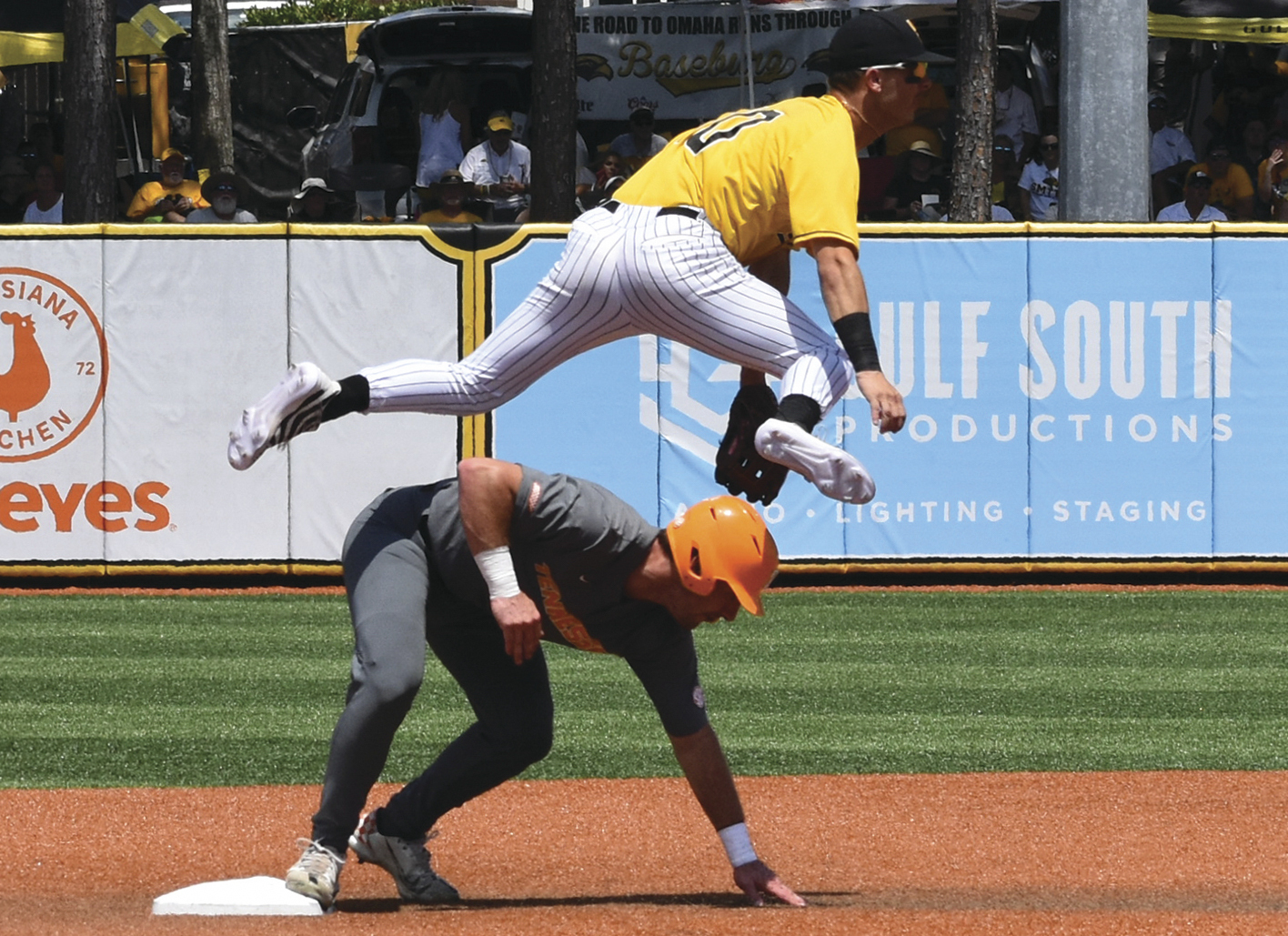Mississippi Today
Tennessee rallies to set up winner-take-all game 3 against USM


HATTIESBURG — Southern Miss was up one game in the best-of-three Super Regional and had snatched a 4-0 lead over Tennessee in Game 2. A sun-baked, humidity-broiled overflow crowd at Pete Taylor Park of 5,882 was thundering its approval Sunday. The Golden Eagles were six innings away from a trip to the College World Series, and two-time All-American Tanner Hall was on the mound.

Then it happened.
Christian Moore doubled to left field to start the Tennessee fourth. After a fly out, Merritt Griffin singled home Moore to cut the lead to 4-1, bringing first baseman Blake Burke, a left-handed slugger, to the plate. The count reached two balls and two strikes, and Hall threw a slider, down at the knees across the plate.
“A good pitch,” USM coach Scott Berry would later say. “It wasn’t like Tanner hung it. It was a good pitch down in the zone.”
Burke unleashed a violent swing, connected and there was never any doubt. Golden Eagle right fielder Carson Paetow just turned around and stared. He didn’t move. No need.
Burke’s blast rocketed far above the smoking barbecue grills in Southern Miss’ right field roost, sailed through the tops of tall pine trees, landed in the parking lot of St. Thomas Aquinas Catholic Church, and then one-hopped high off the church’s brown exterior.
We were told in the press box Burke’s two-run home run, which cut USM’s lead to 4-3, traveled 479 feet from home plate. It did more than that. It changed the game.
Tennessee coach Tony Vitello used a basketball metaphor. “It’s like in basketball where two points is two points, but yet an emphatic slam dunk can kind of change the momentum of the entire game. A home run like that can be like a slam dunk. It changes the mood in the dugouts. It kind of changes everything.”
Burke’s blast surely seemed to do just that. Before the fourth inning was over, the Vols would score three more runs, take a 6-4 lead and never look back for an 8-4 victory that sends this Hattiesburg Super Regional to a third and deciding game Monday. As of 7:15 p.m. Sunday, ESPN had not chosen a Monday game time.

The first two days of this Super Regional have been like a grueling, sweat-drenched marathon. Southern Miss won the first game, which began at 2 p.m. Saturday, endured two lengthy weather delays, and ended early Sunday afternoon. After leading 4-0 Saturday, Southern Miss held on for a hard-earned 5-3 victory.
Beginning at 11 a.m., Justin Storm pitched the last 4.2 innings for Southern Miss for the victory, blanking the powerful Vols on just two hits after Billy Oldham had given the Golden Eagles a quality start the day before. Shortstop Dustin Dickerson slammed a home run and a double, second baseman Nick Monistere homered and left fielder Tate Parker ripped a two-run triple.
Game 2 also started well for the home team. Hall blanked the Vols for three straight innings and then his teammates struck for four runs in the third inning off Tennessee’s highly touted right hander Chase Dollander, expected to be a top 10 pick in this summer’s Major League draft.
Christopher Sargent’s three-run home run off the scoreboard in left field was the big blow of the four-hit, four-run inning. But who would have thought it? Southern Miss never managed another hit off Dollander, who mixed 96- and 97-mph fastballs with some nasty breaking pitches. Dollander only seemed to get stronger. Put it this way: Dollander’s 107th pitch in the 9th inning was a 97-mph fastball on the inside corner.
Dollander couldn’t quite finish. Vitello brought in Chase Burns for the final three outs, which must have seemed like good news for the Golden Eagles at the time. But then three of Burns’ first four pitches hit 100 mph on the radar gun and he used just 10 pitches to get the last three outs.
Berry, who Monday could be coaching his last game of a remarkable 14-year run as Southern Miss coach, often likens post-season baseball games to heavyweight fights. In this Super Regional, Tennessee has gotten off the canvas and floored Southern Miss with a bevy of punches, including Burke’s haymaker.
How will the Golden Eagles respond?
Hall, who might well have pitched his last game as a Golden Eagle Sunday, believes he knows. “We know what it takes to win and we’ll do what it takes to win,” Hall said. “After a tough loss, we always come back.”
Said Berry, “We are a veteran team. We believe in ourselves.”
Tennessee, just one season removed from being one of the most dominant regular season teams in college baseball history, is likewise a veteran team that feels like it has some unfinished business after falling flat in its own Super Regional last year.
So here we are, one game, winner-take-all for a ticket to Omaha. Tennessee will likely pitch sophomore Drew Beam (8-4), who won the final game of the Clemson Regional. USM will likely go with either sophomore Nikko Mazza (5-1) or junior Matthew Adams (3-2).
This article first appeared on Mississippi Today and is republished here under a Creative Commons license.
Mississippi Today
Coast judge upholds secrecy in politically charged case. Media appeals ruling.
A Jackson County Chancery Court judge is denying the public access to a case that involves several politically connected Mississippians and their failed venture to ticket uninsured motorists using cameras and artificial intelligence.
Media companies Mississippi Today and the Sun Herald have filed for relief with the state Supreme Court, arguing that Chancery Judge Neil Harris improperly closed the court file without notice and a hearing to consider alternatives. The media outlets say the court file should be opened.
Mississippi Today in June filed its motion asking that Harris unseal the case, which he denied six days later.
Gulfport attorney Henry Laird writes in the media companies’ petition for state Supreme Court review, “The Chancery Court sealing the entire court file both before and after Mississippi Today’s motion to unseal the file violates the public and press’ cherished right of openness and access to its public court system and records.”
Mississippi judges have long followed a 1990 state Supreme Court decision that says, “A hearing must be held in which the press is allowed to intervene on behalf of the public and present argument, if any, against closure.”
Instead, Harris said he found no hearing necessary after reviewing the pleadings to open the file. The case, he said, is between two private companies.
“There are no public entities included as parties,” he wrote, “and there are no public funds at issue. Other than curiosity regarding issues between private parties, there is no public interest involved.”
The case involves what is usually a public function: Issuing tickets to the owners of uninsured vehicles. And, according to one party to the case, the Mississippi Department of Public Safety is owed $345,000 from the uninsured motorist program.
READ MORE: Private business ticketed uninsured Mississippi vehicle owners. Then the program blew up.
Since the entire court file is closed, the public is unable to see why the judge sealed the case. The Mississippians said in the Chancery Court case that they have “substantial” business interests to protect and “a lot of political importance,” an attorney opposing them said in a related federal case that is not sealed.
Georgia-based Securix LLC signed up its first Mississippi client in 2021, the city of Ocean Springs, an agreement with the city showed. Securix developed a program that uses traffic cameras, artificial intelligence and bulk data on insured motorists to identify the owners of vehicles without insurance.
To sign on other Mississippi cities, Securix enlisted three well-known consultants, Quinton Dickerson, Josh Gregory and Robert Wilkinson. Dickerson and Gregory are Republican political operatives in Jackson who have run numerous state and local campaigns and advise many of the state’s top elected officials. Wilkinson, a Coast attorney, has represented local governments and government agencies, including the city of Ocean Springs.
MS business partnership sours
In 2023, the Mississippians formed QJR LLC. Their company entered a 50-50 partnership with Securix called Securix Mississippi.
Securix Mississippi sold the cities of Biloxi, Pearl and Senatobia on the uninsured driver program.
Fees collected from uninsured drivers were apportioned to the company, the cities and the Department of Public Safety, the operating agreement with Biloxi showed.
The citations offered three options, according to copies included in a federal lawsuit filed by three Mississippi residents who received them:
- Call a toll-free number and provide proof of insurance.
- Enter a diversion program that charges a $300 fee and includes a short online course and requires agreement that the vehicle will not be driven uninsured on public roadways.
- Contest the ticket in court and risk $510 in fines and fees, plus the potential of a one-year driver’s license suspension.
The Securix Mississippi partnership soon soured.
Securix Chairman Jonathan Miller of Georgia said in a sworn court declaration submitted in the federal case that he was subjected around March 2024 to a “freeze out” by members and/or employees of QJR. They stopped giving him information, Miller said.
The Department of Public Safety in August pulled the plug on the controversial ticketing program, shutting off the company’s access to the insured driver database.
In September, QJR filed its Chancery Court lawsuit against Securix LLC.
What is known about the case comes from documents in the federal court file. QJR claims the company and its members have been defamed by Miller and Securix and wants their 50-50 business partnership dissolved.
The Chancery Court case does not even show up when the parties are searched for by name.
With a case number gleaned from the federal court file, a search of chancery records shows only that the case is under seal.
Normally, when a case is under seal, the docket would still be available. A docket lists all records and proceedings in a case. While sealed records are listed and described, they can’t be viewed.
“There is no court file,” attorney Laird said in asking the Supreme Court to review Judge Harris’ decision to leave the file sealed. “There is no docket sheet. There is absolutely no access on the part of the public or press to their public court file in this case.”
Judge closes file without public notice
All Mississippi court files are presumed open unless they are closed with notice and a hearing under guidelines established in the 1990 case Gannett River States Publishing Co. vs. Hand.
“It appears that the judge ignored what has been settled law in Mississippi since 1990,” said retired Jackson attorney Leonard Van Slyke, who represented Gannett in the case and still advises the media.
He added, “Since that time, there have not been many efforts to close a courtroom or a court file because the rules are pretty clear as to when that can be done. It is obvious from the rules that this would be a rare occurrence.”
A court file can be closed only if a party in the case requesting closure can show an “overriding interest” that would be prejudiced by publicity.
The Supreme Court said in 1990 that the public is entitled to at least 24 hours’ notice — on the court docket — before a judge considers closure. As a representative of the public, the media has a right to a hearing before a court file or proceeding is closed.
At the hearing, the judge must consider the least restrictive closure possible and reasonable alternatives. The judge also must make findings that explain why alternatives to closure were rejected.
The court wrote in Gannett vs. Hand:
“A transcript of the closure hearing should be made public and if a petition for extraordinary relief concerning a closure order is filed in this Court, it should be accompanied by the transcript, the court’s findings of fact and conclusions of law, and the evidence adduced at the hearing upon which the judge bases the findings and conclusions.”
Because Judge Harris held no hearing, the high court will have a scant record on which to base its review. Without a court record, Laird pointed out in his filing, the public can have no confidence the judge made a sound decision.
Kevin Goldberg, an attorney who serves as vice president and First Amendment expert at the nonpartisan, nonprofit Freedom Forum, said the First Amendment guarantees the public access to courts.
In the Securix case, he said, a private business was doing work normally performed by a police department or other public agency, and residents could be snared into legal proceedings when they received tickets and public funds were involved.
“These are not private people in a small town, going about their business,” Goldberg said. “These people’s business is the public’s business . . . I think that means they need to accept that they’re going to be scrutinized all the time, including when they voluntarily make a decision to go to court.”
This article was produced in partnership between the Sun Herald and Mississippi Today.
This article first appeared on Mississippi Today and is republished here under a Creative Commons Attribution-NoDerivatives 4.0 International License.
The post Coast judge upholds secrecy in politically charged case. Media appeals ruling. appeared first on mississippitoday.org
Note: The following A.I. based commentary is not part of the original article, reproduced above, but is offered in the hopes that it will promote greater media literacy and critical thinking, by making any potential bias more visible to the reader –Staff Editor.
Political Bias Rating: Center-Left
This article maintains a largely factual and investigative tone, focusing on government transparency, judicial procedure, and public access to court records. It critiques the secrecy upheld by a judge in a politically sensitive case involving private companies executing public functions, highlighting concerns about accountability and public interest. The framing leans slightly toward advocating for open government and media rights, values often associated with center-left perspectives. However, it stops short of overt ideological framing or partisan language, striving to report the facts and legal context while underscoring the public’s right to scrutiny.
Mississippi Today
Why Andy Gipson is running for governor
Republican Andy Gipson, the first candidate to publicly announce a run for Mississippi governor in 2027, outlines his five-plank platform. No. 1 is fighting crime, which Gipson says is rising in what were once quiet rural areas, because “If people don’t feel safe, nothing else matters.” He also offers a brief sampling of his baritone crooning from his just-released two studio albums.
This article first appeared on Mississippi Today and is republished here under a Creative Commons Attribution-NoDerivatives 4.0 International License.
The post Why Andy Gipson is running for governor appeared first on mississippitoday.org
Mississippi Today
‘Will you trust us?’: JPS plan for stricter cellphone policy makes some parents anxious
Superintendent Errick Greene wanted to be very clear with the roughly 50 parents who attended Thursday night’s community listening session: Jackson Public Schools already has a policy banning students from using cellphones at school.
But the leadership of Mississippi’s third-largest school district has decided that a new approach is in order, citing a series of incidents in recent years involving students using their cellphones to bully others, organize fights or text their parents inaccurate information about violence happening at or near their school.
“To be clear, it’s not the majority of our scholars, but I can’t look at a class and know who’s gonna be bullying today, who’s gonna be scheduling a meetup to cut up today,” Greene said toward the end of the hour-long meeting held at the JPS board room. “I can’t look at a group of scholars and say, ‘OK, yeah, you’re the one, let me take your phone, the rest of you can keep it.’”
Under the rewritten policy, students who take their phone out of their backpacks during the instructional day will lose it for five days for the first infraction, 10 days for the second and 45 days for the third. Currently, the longest the school will hold a phone is 10 days.
The Jackson school board is expected to consider the new policy at its meeting next week and the district hopes to implement the change when the new school year starts later this month, said Sherwin Johnson, the district’s communications director.
Students also currently have the option to pay up to a $25 fine to get their phone back, but the district wants to rescind that aspect of the policy.
“We’ve discovered that’s not equitable,” said Larrisa Harris, the JPS general counsel. “Not everybody has the resources to come and pay the fine.”
Support for the new policy among the parents who spoke at the listening session varied, but all had questions. How will students access the internet on their laptops if the WiFi is spotty at their school and they need to use their cellphone hotspot? If students are required to keep their phones in their backpacks during lunch, how will teachers prevent stealing? How will JPS enforce the ban on using cellphones on the bus?
One mother said she watches her daughter’s location while she rides the bus to Jim Hill High School so she knows her daughter made it safely.
“If they can’t have it on the bus, who’s gonna enforce that?” she said. “I’m just gonna be real, the bus driver got to drive.”
A common theme among parents was anxiety at the prospect of losing direct contact with their kids in the event of an emergency. A Pew Research survey found that most adults, regardless of political affiliation, support cellphone bans in middle and high school classes. But those who don’t say it’s because their child can use their phone during emergencies.
“If something happened, will we get an automatic alert to notify us? Because a lot of the time we see things on social media first,” said Ashley McIntyre, a mother of three JPS students. She attended the meeting with her eldest daughter, Aaliyah, who recently graduated from Powell Middle School.
Though JPS does have an alert system for parents, McIntyre said she didn’t know if it existed. She cited a bomb threat at Powell last year that she found out about because Aaliyah texted her, not through a school alert.
“We didn’t know what was going on, and she texted me, ‘Mom, I’m scared,’ so I went up there,” McIntyre said. “So that puts us on edge.”
Aaliyah said she uses her phone to text her mom and watch TikTok, but she feels like her classmates use their phones to be popular or to fit in. When a fight happens, she said many students pull out their phones to record instead of trying to get an adult who can stop it. Then the videos end up on Instagram pages dedicated to posting fights in JPS.
“Once the principal found out about the fight pages, they came around looking inside our videos and camera rolls,” she said. “It happened to me last year. They thought I had a fight on my phone.”
Toward the end of the meeting, Laketia Marshall-Thomas, the assistant superintendent for high schools, took the mic to respond to one parent who said she was concerned that older students would not come to school if they knew their phone could be taken.
“What we have seen is, it’s the older students—” Marshall-Thomas began.
“They are the problem,” someone from the audience chimed in.
“We’re not saying they cannot have them,” she continued. “We know that they have after school activities and they need to communicate with their moms … but we have had major, major issues with cellphones and issues that have even resulted in criminal outcomes for our scholars, but most importantly, our students … have experienced a lot of learning loss.”
While the district leadership did not go into detail about the criminal incidents, several pointed to instances where students have texted their parents inaccurate information, such as an unsubstantiated rumor there was a gun during a fight at Callaway High School or that a shooting outside Whitten Middle School occurred on school property.
“Having phones actually creates far more chaos than they help anyone,” Greene said.
While cellphones have been banned to varying degrees in U.S. schools for decades, youth mental health concerns have renewed interest in more widespread bans across the country. Cellphone and social media usage among school-aged kids is linked to negative mental health outcomes and instances of cyberbullying, research shows.
At least 11 states restrict or ban cellphone use in schools. After Mississippi’s youth mental health task force recommended that all school districts implement policies that limited cellphone and social media usage in classrooms, a bill that would’ve required school boards to create cellphone policies died during the legislative session. Still, several Mississippi school districts have passed their own policies, including Marshall County and Madison County.
Another concern about the ban was a belief among a couple of speakers at the meeting that cellphones can help parents hold the district accountable for misdeeds it may want to hide.
“I just saw a video today. It was not in JPS, but it was a child being yelled at by the teacher and had he not recorded it, his momma would have never known that this sweet lady that they go to church with is degrading her child like that,” one mother said.
Statements like these prompted responses from teachers and other parents who urged the skeptical attendees to be more trusting or to make sure the district has updated contact information for them in case school officials need to reach parents during an emergency.
“I think we have to trust the people watching over our children,” said one of the few fathers who spoke. “When I grew up, what the teacher said was gold.”
One teacher asked the audience, “Will you trust us?”
This article first appeared on Mississippi Today and is republished here under a Creative Commons Attribution-NoDerivatives 4.0 International License.
The post ‘Will you trust us?’: JPS plan for stricter cellphone policy makes some parents anxious appeared first on mississippitoday.org
Note: The following A.I. based commentary is not part of the original article, reproduced above, but is offered in the hopes that it will promote greater media literacy and critical thinking, by making any potential bias more visible to the reader –Staff Editor.
Political Bias Rating: Centrist
The article presents a balanced report on Jackson Public Schools’ proposed stricter cellphone policy without taking a clear ideological stance. It fairly conveys the perspectives of school officials emphasizing discipline and safety, alongside parental concerns about communication and emergency access. The tone remains neutral, focusing on factual details such as policy changes, reasons behind them, and community reactions. While it includes some skepticism from parents and responses from district staff, the language does not endorse or oppose either side. Overall, the coverage adheres to neutral, factual reporting by presenting multiple viewpoints without editorializing.
-
News from the South - North Carolina News Feed6 days ago
Learning loss after Helene in Western NC school districts
-
News from the South - Tennessee News Feed1 day ago
Bread sold at Walmart, Kroger stores in TN, KY recalled over undeclared tree nut
-
News from the South - Missouri News Feed6 days ago
Turns out, Medicaid was for us
-
Local News7 days ago
“Gulfport Rising” vision introduced to Gulfport School District which includes plan for on-site Football Field!
-
News from the South - Florida News Feed6 days ago
The Bayeux Tapestry will be displayed in the UK for the first time in nearly 1,000 years
-
News from the South - Louisiana News Feed7 days ago
With brand new members, Louisiana board votes to oust local lead public defenders
-
Mississippi Today4 days ago
Hospitals see danger in Medicaid spending cuts
-
News from the South - Texas News Feed7 days ago
As floods recede, Kerrville confronts the devastation





















































